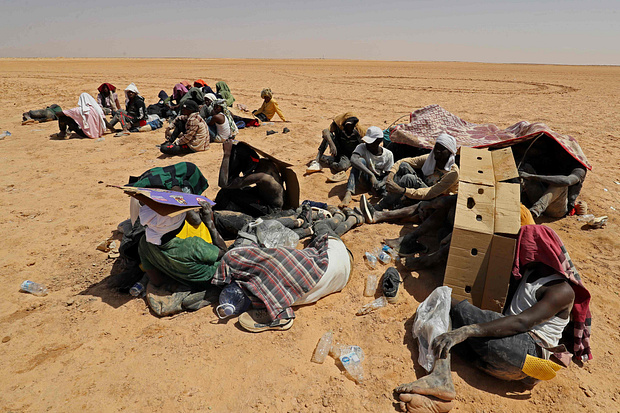In the middle of a sandy desert near Libya, a group of African refugees are huddled together.
They sit in the 40-degree heat with no water, food, or clothing.
Libyan border guards say they are sub-Saharan African refugees, numbering around 80, including children and women.
Deported to Libya from Tunisia, “border guards have rescued between 50 and 70 migrants, with the number of migrants increasing daily,” according to AFP.
Al Jazeera also told the story of refugees stuck on a deserted island.
Most of the refugees said they were seized by Tunisian police and left in the desert or on uninhabited islands between the Libyan and Algerian borders. They emphasized that even those who were injured were deported unconditionally, without food or water.

■Tunisia Takes a Hardline Approach to Swarming African Refugees
Tunisia has long been considered a transit point for African refugees trying to reach Europe. Most board illegal migrant boats in Tunisia’s coastal city of Sfax and illegally enter Europe. This year, more than 14,000 refugees set foot on European soil through Tunisia in the three months to June, including 8,000 in April, according to the Guardian.
About 75,000 refugees have arrived in Italy by boat this year, more than double the number from the same period last year. More than half have reportedly traveled from Tunisia.
The influx of migrants has led to clashes between locals and them since the beginning of the year, with Tunisian President Caid Bouzid declaring a hard line against migrants, and hostility towards them becoming overt.
In the past three days, the killing of a resident has prompted Tunisian authorities to deport refugees to the desert and uninhabited islands along the country’s borders with Libya and Algeria.

■ “Stop the refugees” EU pulls out ‘nearly $1 trillion’ for Tunisia
It’s not just Tunisia that has taken a knife to the refugee problem. Europe has also stepped up to the plate to stop North African refugees from entering the country illegally.
The European Union signed a huge memorandum of understanding with Tunisia on April 16. 먹튀검증 In exchange for a package worth 1 billion euros (about 1.42 trillion won), Tunisia will strengthen border management and control and search for illegal migrants.
Specifically, the package includes a review of €900 million worth of macroeconomic financial assistance to struggling Tunisia, along with an immediate €150 million (about KRW 240 billion).
EU Commission President Ursula Von der Leyen, Italian Prime Minister Giorgia Meloni, and Dutch Prime Minister Mark Rutte traveled to Tunisia and met with Tunisian President Zine El Abid to agree on the implementation of the “Comprehensive Partnership Package”.
At a press conference after the agreement was signed, Dutch Prime Minister Rutte emphasized that “migration is a crucial element of this agreement,” and that “it is essential to further strengthen the control of illegal immigration.”
In the wake of recent tragedies, such as the sinking of a refugee boat, the EU has emphasized the need to crack down on brokers who arrange for illegal migrants.
Concerns that “Tunisian authorities support human rights abuses”
Underlying the agreement is the EU’s calculation that Tunisia is in dire economic straits, and that helping to stabilize the country’s economy will deter people from fleeing the crisis, including illegal immigration.
But it has also drawn criticism, most notably over human rights abuses.
Criticism has also come from within the EU, with Human Rights Watch warning that it would “empower the coastguard, which has a history of repression against migrants and asylum seekers.” There is also a risk of encouraging more abuses.
